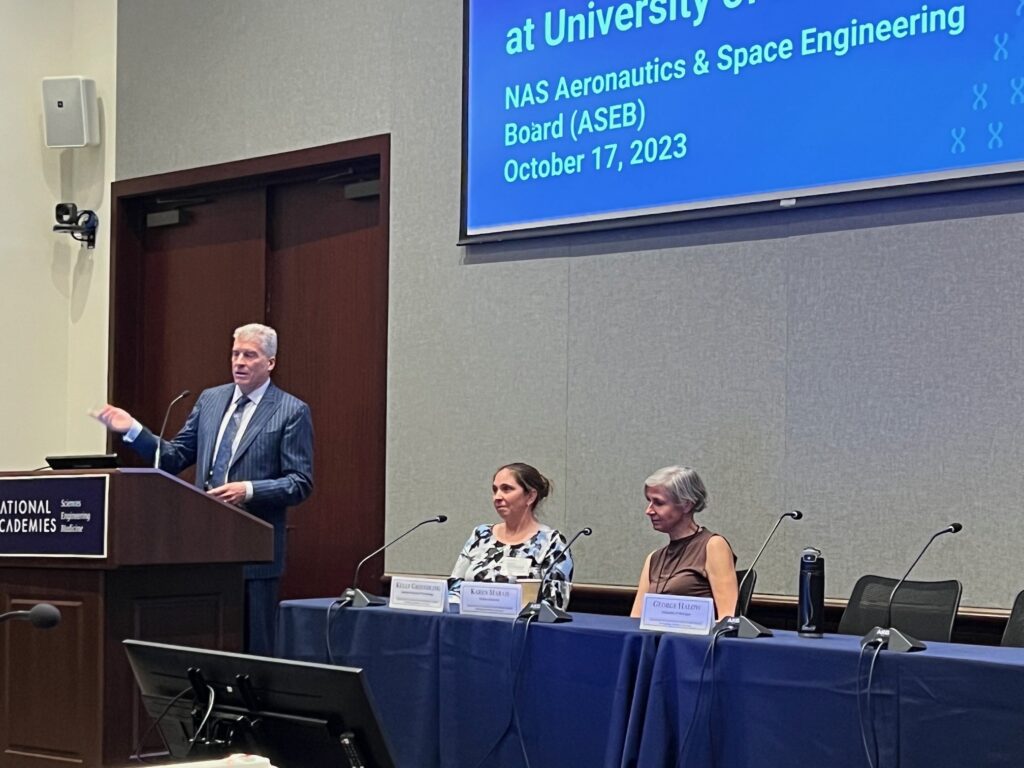
George Halow Participates in National Academies Aeronautics and Space Engineering Board Meeting – 2023 Fall
Sharing insights on the aeronautics workforce focusing on talent, recruitment, and training from an academic perspective

Sharing insights on the aeronautics workforce focusing on talent, recruitment, and training from an academic perspective
George Halow had the prestigious honor of participating in the 172nd meeting of the Aeronautics and Space Engineering Board (ASEB) at the National Academies of Sciences, Engineering, and Medicine (NASEM) Beckman Center, in Irvine, CA. Here, he helped share insights on the aeronautics workforce, focusing on talent, recruitment, and training from an academic perspective. His attendance and active involvement shed a light on the remarkable work being done here at the University of Michigan, emphasizing the importance of education and collaboration with students and industry partners.
“I was beyond honored. If someone told me when I retired from Ford that, in four and a half years I would be a panelist on a major Board (ASEB) panel discussion for the National Academies of Sciences, Engineering, and Medicine, I’d have told them they were crazy,” Halow remarked.

Professor Halow has been making waves at Michigan Aerospace since the launch of the Model-Based Systems Engineering (MBSE) and the systems engineering leadership course series that started in fall of 2022. Thanks to his dedicated efforts, he has developed an unprecedented undergraduate course series, attracting significant corporate interest and donations. The MBSE Leadership Lab has become a beacon of student projects, team collaboration, mentorship, and teamwork, covering various aspects of the aerospace industry including leadership, culture, communication, and careers in aerospace.
The National Academies of Sciences, Engineering, and Medicine, commonly known as the National Academies, serves as the collective scientific national academy of the United States. Established in 1863, NASEM provides independent, objective advice to shape evidence-based policies, foster progress and innovation, and address complex societal issues.
The ASEB is a unit of NASEM, with a mission “to focus talents and energies of the engineering community on significant aerospace policies and programs.” Holding a role on this board is Professor Anthony Waas, the previous Chair of the Department of Aerospace Engineering at the University of Michigan and the Felix Pawlowski Collegiate Professor of Aerospace Engineering. Additionally, Sean Bradshaw, a Senior Sustainability Fellow at Pratt & Whitney and a prominent supporter of the Leadership Lab and System Engineering Courses at U-M, is also a member of the ASEB.
During the panel presentation, Professor Halow collaborated alongside Dr. Kelly Griendling from Georgia Tech and Dr. Karen Marais from Purdue University. The three panelists represented three of the top-ranked aerospace engineering degree programs in the country, sharing valuable insights into what is necessary to foster the next generation of the aerospace industry.
The co-panelists emphasized different processes that are being faced in the early years of students’ educational journeys and within the current job market of the aerospace industry at large. They underscored the importance of modernizing the university aerospace curricula to meet current day needs and expectations.This involves collaborative efforts with industry leaders to create more meaningful experiences for students, ensuring they are well-prepared once they hit graduation.
Dr. Griendling began the panel presentation by discussing strategies for recruiting and encouraging strong students pre-college. She talked about working to inspire the younger generation to pursue aerospace engineering through hands-on experiences, not typically encountered until later in their academic journey. Dr. Marais followed up by addressing the various trials and challenges of effectively guiding even more students while they are in their college years. Finally, Professor Halow spoke about the benefits of providing current students with real-world experiences in the classroom, by giving them a competitive advantage in industry or even labs and academia and better preparing them for their careers post-graduation.
“The three panelists got substantial positive feedback and comments of gratitude as we all talked about how challenging our missions can be, and how a positive comment from a student whose life you may have changed makes all the insane workload, stress, and responsibility worthwhile!” Professor Halow commented.
Professor Halow’s participation highlighted the importance of the MBSE/x88 courses within the University of Michigan Aerospace Engineering Department. He stated during his presentation, “We attract a lot of industry attention on this one (the MBSE Leadership Lab). We basically raised a substantial sum of corporate financial support, much of that in the middle of the pandemic, for instructional lab space which is almost unheard of!”
He goes on to mention the continued attention that the program has gotten from the College of Engineering and non-aero students being interested in the exciting opportunity. “I think the fact that the University of Michigan was chosen as one of the three institutions, in addition to Georgia Tech and Purdue, speaks volumes for us. It was great visibility for Michigan Engineering and for Michigan Aerospace.” The MBSE and x88 course series have become a point of pride within Michigan Aerospace, gaining the public’s attention from around the country.
With the growing popularity of the aerospace industry and these hands-on curriculums, the need for space and resources have grown exponentially. A focal point during this panel was the need for academic careers within aerospace to become more desirable to those graduating, in an effort to encourage individuals to pursue the teaching and mentoring of the next generation of students and engineers.
The goal of this most recent meeting was to feature innovative work being done in some of the top aerospace engineering programs, and to migrate and replicate these efforts in the name of strengthening the aeronautical and space industries. This is done, in part, through growing the talent pipeline and making the ASEB “savvy” on the latest engineering tools and methodologies such as MBSE and the fundamentals of systems engineering.